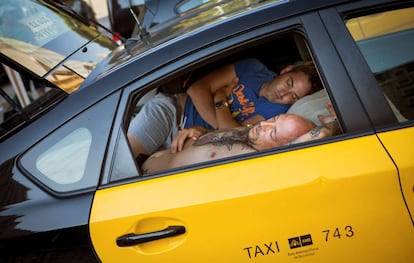Spanish taxi drivers end their strike “for now”
Sector warns it will protest again if vague government proposal fails to restrict ride-hailing vehicles

Taxi drivers in Madrid and Barcelona have decided to call off their strike, but warn that this is just “a truce.” The decision was made late on Wednesday following a meeting between national and regional authorities in connection with an ongoing conflict over ride-hailing companies, which the taxi sectors views as unfair competition.
The meeting ended with a proposal by the Spanish government to let regional authorities decide whether they want to take over responsibility for issuing VTC (chauffeured vehicle) licenses, which companies like Uber and Cabify operate under.

“This is a technical stop, a truce; if we have to return to the streets in September or October, we will,” said Julio Sanz, head of the Antaxi association, to the hundreds of taxi drivers who had been camping out since Monday on Paseo de la Castellana, outside the Public Works Ministry where the meeting took place.
In Barcelona, taxi drivers cleared the Gran Via, but called the decision “a truce” as well.
Meeting
On Wednesday, Public Works Minister José Luis Ábalos sat down with regional leaders to discuss a new regulatory framework that would give the latter powers over urban mobility that currently fall to the state. Regional governments would have the option to accept this new responsibility or not. Those who refuse would continue to be governed by national regulations encoded in the Land Transportation Law.

This new framework would be ready for approval in September, said Ábalos, who also announced the creation of a working group to develop a code of good practices for the urban transportation sector, to try to make the existing competition between taxis and ride-hailing vehicles “into something that benefits public service.”
Indifference
Regional authorities were either distrustful or indifferent to the central government’s proposal to transfer powers to them. The overall feeling was that Madrid is looking for a stopgap solution, and that it has not specified how to enforce existing legislation stating that only one VTC license may be awarded for every 30 taxi licenses. This has been one of the taxi sector’s main demands.
Representatives from the Galicia government asked for further details about the reform, while those from Extremadura and Catalonia requested additional funds. The delegation from Andalusia walked out just minutes after the meeting got underway.
Licenses in numbers
There are currently 9,366 VTC vehicles and 65,277 taxicabs operating in Spain, representing a 1-7 ratio. This is higher than the 1-30 ratio established by a 2015 decree on transportation. Madrid has the most ride-hailing vehicles, 4,308, followed by Barcelona with 1,363. There are a further 10,000 VTC licenses slowly going on the market that were issued between 2009 and 2013, when the Socialist administration of ex-prime minister José Luis Rodríguez Zapatero passed legislation to liberalize the economy and eliminated all caps on VTC licenses. These permits are being released through court rulings.
Madrid’s regional premier, Ángel Garrido of the Popular Party (PP), said that the Socialist administration of Pedro Sánchez should not be trying “to disperse the problem.”
“Powers, yes. A hot potato, no,” summed up Isidre Gavín, the Catalan secretary of infrastructure and mobility, who warned that Catalonia will only accept responsibility over VTC licenses if these powers are “full and effective, not just a transfer of the problem.”
The taxi sector has said that regardless of who has power over the matter, the important thing is that this authority will enforce restrictions on VTC licenses. Taxi drivers favor giving powers to local authorities, following the lead of Barcelona Mayor Ada Colau, who recently attempted to reduce the number of ride-hailing vehicles in the Barcelona metropolitan area.
That move was challenged by Spain’s competition oversight body CNMC, and initially also by the Public Works Ministry (which later withdrew its appeal), and Catalonia’s regional high court placed the Barcelona regulations on hold, on the basis that they were encroaching on powers that legally fall to the Spanish state.
The taxi sector in Barcelona responded by going on an indefinite strike on Saturday. The stoppage then spread to Madrid, Valencia, Alicante, Seville, Málaga, Zaragoza, and several municipalities in the Basque Country and La Rioja. Major thoroughfares in Madrid and Barcelona were blocked by taxicabs, whose drivers camped out in tents and inside their vehicles for days.
“The national law has to make it crystal clear that city councils have direct power to regulate VTC operations,” said Tito Álvares, spokesman for Élite Taxi and a protest leader. The cities of Madrid, Valencia and Barcelona, which are run by leftist governments, have been sympathetic to the taxi sector’s demands. Despite the fact that they have been blocking major streets in all three cities without requesting authorization to hold a public demonstration, local authorities have neither forced them out or imposed sanctions of any kind.
Unauto, the association of ride-hailing companies, has protested this attitude. “This is a lockout, not a strike. And it’s completely illegal,” said Unauto president Eduardo Martín. But Madrid’s mobility chief, Inés Sabanés, on Wednesday claimed that the municipal police had “no capacity and no power” to act against the road block on Paseo de Castellana. Restaurants and stores located along blocked thoroughfares in Barcelona have complained about a drop in sales since the strike began.
English version by Susana Urra.
Tu suscripción se está usando en otro dispositivo
¿Quieres añadir otro usuario a tu suscripción?
Si continúas leyendo en este dispositivo, no se podrá leer en el otro.
FlechaTu suscripción se está usando en otro dispositivo y solo puedes acceder a EL PAÍS desde un dispositivo a la vez.
Si quieres compartir tu cuenta, cambia tu suscripción a la modalidad Premium, así podrás añadir otro usuario. Cada uno accederá con su propia cuenta de email, lo que os permitirá personalizar vuestra experiencia en EL PAÍS.
¿Tienes una suscripción de empresa? Accede aquí para contratar más cuentas.
En el caso de no saber quién está usando tu cuenta, te recomendamos cambiar tu contraseña aquí.
Si decides continuar compartiendo tu cuenta, este mensaje se mostrará en tu dispositivo y en el de la otra persona que está usando tu cuenta de forma indefinida, afectando a tu experiencia de lectura. Puedes consultar aquí los términos y condiciones de la suscripción digital.








































